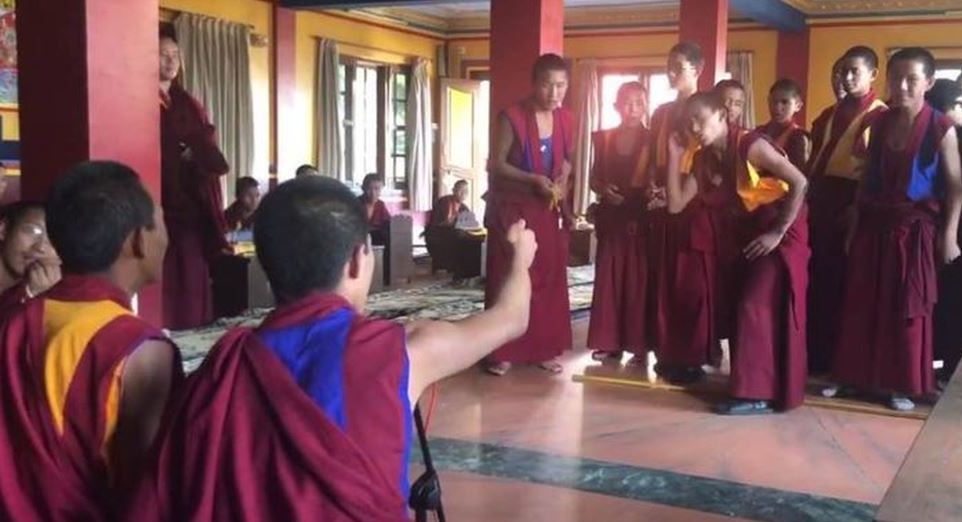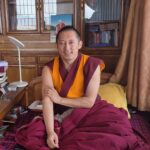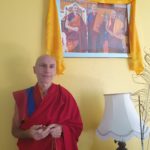In 2019, Shenten Dargye Ling included in its program a course called “Shedra”, focusing on Bon philosophy and the art of dialectic process of disputation. In the course, Western followers of Yungdrung Bon learn how to debate as monks do. Sara Bertók and Wolfgang Reutter, the organizers of Shedra, disclose how it is organized and what they find challenging.
Why was Shedra, the course on philosophical aspects and debating in Yungdrung Bon, introduced in Shenten´s program? I heard that it was a wish of some practitioners, of you, Sara, in the first place. Is that correct?
Sara: No, the idea belonged to our lamas. It was a project of Yongdzin Rinpoche, Khenchen Tenpa Yungdrung Rinpoche and Khenpo Gelek Jinpa. It came up when I was at Shenten organizing a summer retreat and as I was interested in such a course, I offered to organize it. I got involved a lot in it and later I asked Wolfgang to join as a co-organizer, because I did not have the capacity to do it all by myself.
Wolfgang: I was very interested in approaching the philosophy in Yungdrung Bon. When I heard that such a course was being planned, I immediately wanted to participate. And so I did. The first year of the cycle was organized only at Shenten, not online. It was before the “corona” started. I was there. After that Sara asked me if I could step in with the organization of it and so, from the second year on, we have been doing it together. That year, I was also elected as a member of the Council of Association of Shenten Dargye Ling.
Sara: Most of the work went on Wolfi’s shoulder. I support him when I can.
I heard that the lamas were quite skeptical to whether a course on philosophy makes sense, and they are still uncertain about whether it is worth putting energy into it.
Sara: Yes, I can understand that they are skeptical about it and how successful it could be. It is a new subject with a new format, and what we have done can be viewed as a pilot project; to evaluate when the cycle is completed.
Philosophy is a very vast topic in Yungdrung Bon, it takes years to learn it and even more to master it. And this knowledge is necessary in order to debate about it. So, the question is how to do a meaningful course dedicated to Bonpo philosophy when you have only a couple of weeks at your disposal within a year? I think this cycle offers us a very good opportunity to learn from the experience. And we can reflect on how to shape it better, maybe, in the next cycle.
The first part of the five-year-long cycle was held in 2019, right?
Wolfgang: Exactly, it was three weeks all spent together at Shenten. It was wonderful for all of us. It was a real retreat, including regular meditations and offerings. It was a big challenge also, for everybody.
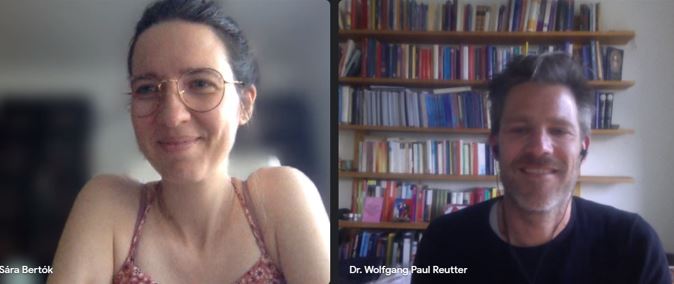
What was the challenge about, specifically?
Wolfgang: It is a huge field of study. Monks study it for years, as Sara said, and we were all just new.
Sara: It was challenging also because we did not follow the monastic system of how they learn. If we had gone the gradual way as the monks do, from the very beginning, it would be very slow and not that interesting for us, and so we started in the middle, reading a quite complex text and then trying to debate over the text. Many people had no experience with the Sutra texts. Most of us know about Dzogchen, from our masters. The Sutric view is very different. The idea of debating about the concepts expressed in these texts was very new for many of us. The first year Khenchen Rinpoche tried to give us an overview of the whole system, talking about the Nine ways of Bon in a structural way, and we started to read the text that we analyzed and debated on throughout this and following years, a text called Salam, The self-commentary of the Magical Lamp of the Stages and Paths, by Nyamme Sherab Gyaltsen.
The method of philosophical analysis that Tibetan monks use is different from how it is done in the field of Western philosophy. You derive your arguments from the text. It is not free reasoning, rather you need to learn quite strict rules and understand the text very well to be able to debate.
I assisted in a couple of sessions the second year, with your kind permission, to get an idea of how the course was, and I could see that there is a pattern in the debate, a certain way of reasoning, but I could not find out easily what the pattern was. It was not possible to use just “common sense” logic.
Wolfgang: Yes, the debate has a strict procedure with rules. There are also different roles: a defender and a challenger. It is a bit like a dance with the rules. You gather and deepen your knowledge with the debate.
Why is the course focused so much on debating? Debate is a complex thing that involves communication, reasoning, gestures… Would it not be better to just read and analyze a philosophical text with a teacher?
Wolfgang: I think that you cannot separate philosophy and debate. It is through debates that knowledge develops. It is really important to know how the tradition developed the knowledge and how it tested it through debate for themselves and with other schools. The course refines logical thinking, in this way. And you can apply those methods we have learned in everyday life, when you become more skillful, of course. Now we are just beginners.
Sara: Debating is traditionally considered to be a very important learning method. It was also used as a way to compete with other spiritual schools. Nowadays, the main purpose is to refine one’s knowledge, your understanding of this knowledge. When you just listen passively to what a teacher says, you may think that you understand. But when you start debating on the subject, following the rules, it really tests your understanding. Your opponent may ask you something that catches you by surprise. You cannot just answer superficially. Your answer must be specific, clear, and very precise. At the first sight what you say may seem correct, but then the challenger puts more pressure on you, and you find out that you have no sufficient arguments, your knowledge is weak.
Debating also teaches resilience, you have to withstand somebody who is insisting on proving your position as not right. Also, it is good training for speaking in public. My impression is that monks who went through it are less shy to speak in front of others, while many Westerners are very shy. Maybe Western schools should introduce debating in their program.
Wolfgang: And it is fun. The more I do, the more I enjoy it. I imagine that it is very pleasurable when you can do it well, including all the movements.
But you do not train it as a performance, right? Since the second year, the Shedra moved online and so you do not meet physically. Did you try it in the first year, at least?
Wolfgang: Not really, we had too little knowledge for that.
Sara: We needed first to learn syllogisms, the patterns of arguments.
Do monks debate from the very beginning of their course on philosophy, or do they have a preliminary course where they get familiar with the subject and rules? I’ve seen very young monks debating.
Wolfgang: Monks learn the basics of philosophy first. We jumped into reading a text that the monks meet only later on in their studies, not immediately. Salam is regarded as the highest text in Bon Mahayana tradition.
Sara: I think that at the beginning, monks train debating on some very easy subjects, like debating on colours, pillars and so on, not on philosophical subjects.
How many people started the course of Shedra that you organize?
Sara: We were fifteen in the first year. We just reached the number fixed by Khenchen Rinpoche as a minimal number to start the program. In the second year there was covid, and we did not know how long it would take and how it would go. We decided then not to consider it as the second year of the course but more as a repetition year.
Wolfgang: And it was also shorter that year, only eight days. The following year, we went back to a full program, but only online. In 2022, it was organized both online and onsite.
So, now four years are completed and one more is ahead, right?
Wolfgang: That’s correct.
How many people are in the course now?
Sara: Quite a lot. Just a few dropped out. And at the official second year, we let new people join.
Wolfgang: This year we were around twenty.
How is the program structured and what do you do, specifically?
Wolfgang: In the first year, Khenchen Tenpa Yungdrung and Khenpo Gelek both taught us, later, Khenpo Gelek took over the entire teaching. In addition, we have had Tibetan lessons with Charles Ramble in each course. We started with spoken Tibetan, and then we proceeded to the classical Tibetan. We have two sessions per day, each one for a different level of participants. This year all was concentrated in the afternoons. The philosophy session was every day from three to five pm. Plus the morning and the evening meditation. All on zoom.
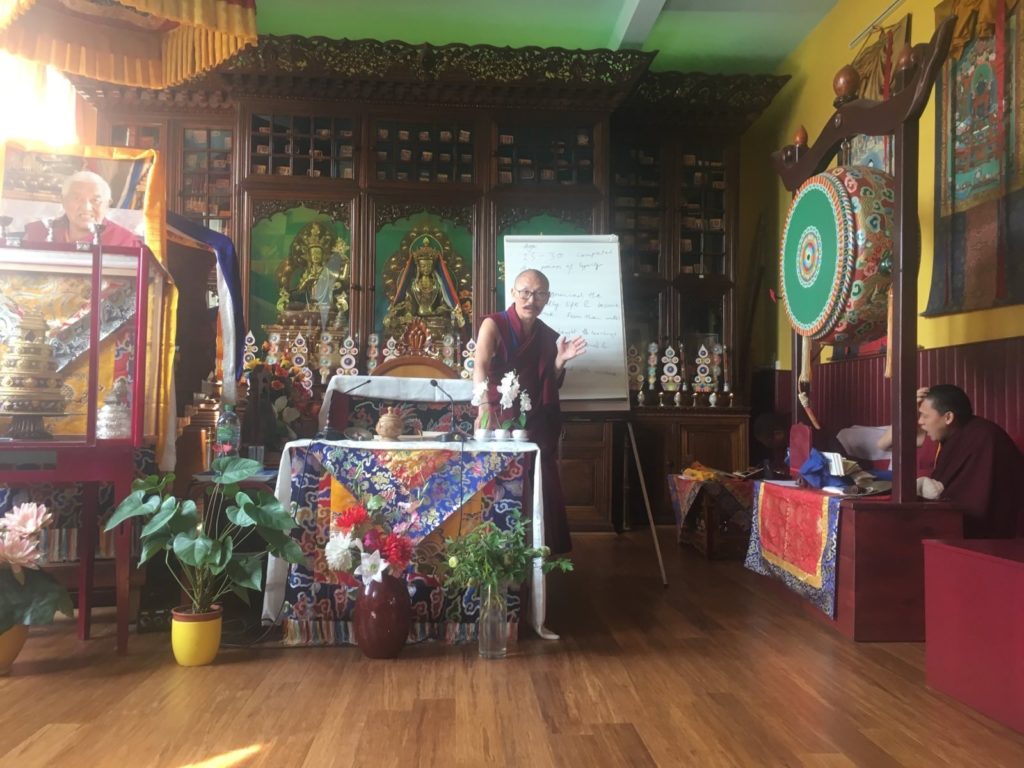
What do lessons in Tibetan look like?
Sara: We have a beginners´ course of spoken Tibetan and a reading class. There are people in the group who are complete beginners, some others with just very little knowledge, others who are intermediate and then some with a really good level of knowledge. We started with two groups. When you approach the Tibetan language, even if you do it with the aim to read dharmic texts, you must learn the alphabet, pronunciation, reading and writing letters. This is quite a long process in Tibetan, and in general it is advisable to start with spoken Tibetan before starting to learn classical Tibetan.
Wolfgang: Charles is a wonderful teacher. In the second year, he went on with us after the closure ended. It was really a precious opportunity. For me, personally, learning Tibetan is very challenging. And I will not be the only one, I guess. Many people tell me the same story. They start, then they drop, then they pick it up again.
As for the results, sometimes I do understand, and some other times I do not understand at all (laughs). But I started to understand the structure of a Tibetan sentence, this was very helpful, and it keeps me going. When you do not know a word, you can find it, but the understanding of how phrases are built is of key importance. I am very much motivated to go on.
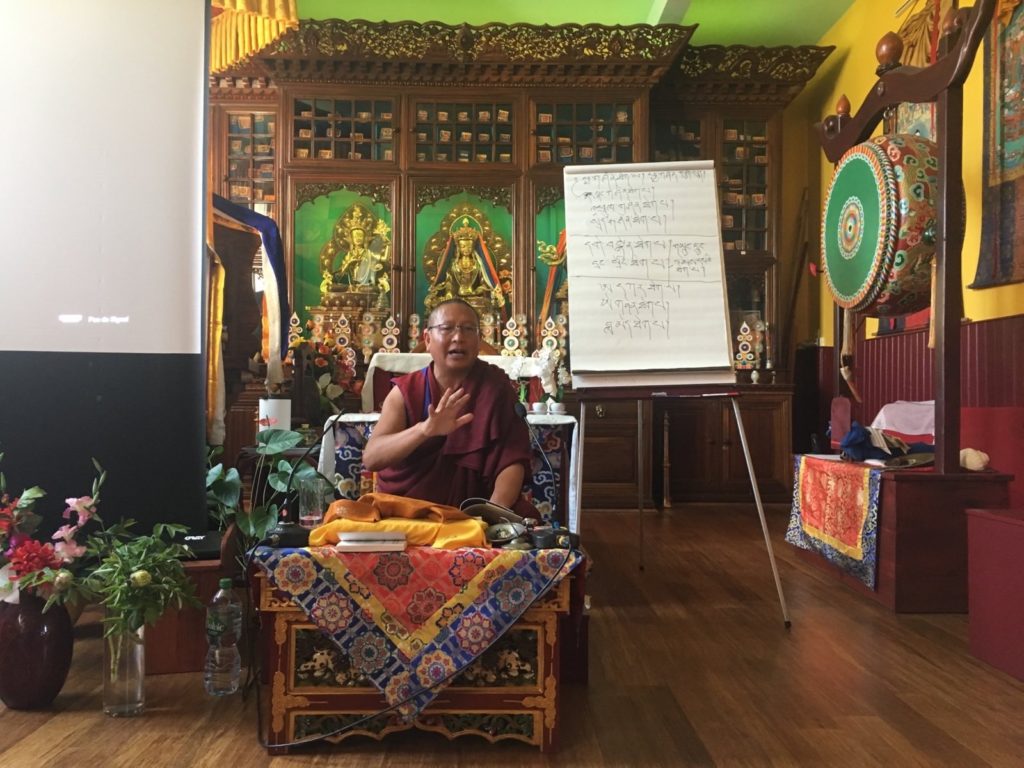
Dharmic texts are concise and condensed. Lamas themselves learn how to interpret them.
Sara: Yes, philosophical, and especially ritual texts, need the support of an oral tradition for interpreting them. A very specific language is used. And you also need the background knowledge to get the meaning well. In a way, it is similar to philosophical texts in Western philosophy, as you also cannot understand them easily without being introduced to their historical and cultural context. And Tibetan texts are even more distant from us, culturally, and also, as we said, the logic which they use is different.
Many of them are ancient, which creates another barrier.
Sara: Yes, the text we read in the course was written in the 14th century. We are attempting to translate it into English, by the way.
Will it be finalized and published; do you have such aspirations?
Sara. It will be cool to publish it at the end. People in the group have been putting lots of effort in it, and they have good skills. It goes very slow, but I have this goal in my mind. It would be a big support for participants in the forthcoming courses, if Shedra continues. And also for anyone who cannot read Tibetan and just wants to know more about Bon philosophy.
